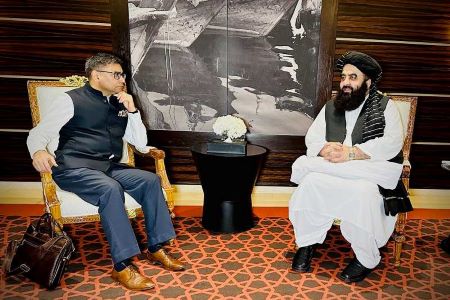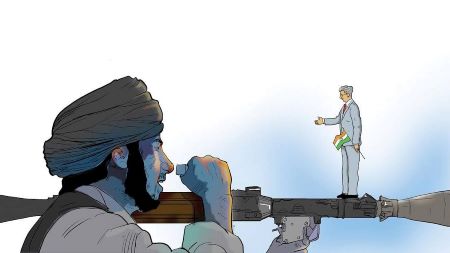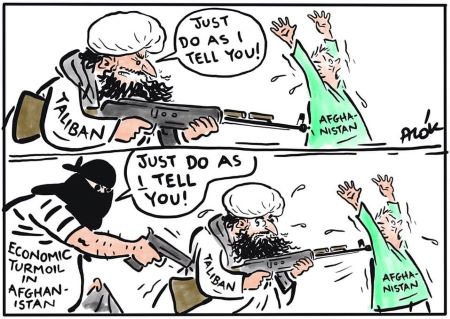India’s engagement with the Taliban 2.0 marks a significant shift in regional diplomacy
THE PTAGMATIC Indian move to court Taliban 2.0 has sent ripples across the region, particularly in Pakistan, their common foe. This bold move will undoubtedly serve to safeguard India’s regional security concerns, while also helping boost its ambition to emerge as a regional leader.
Last week saw an unusual diplomatic development led by India when the country’s top-ranking diplomatic officer, Foreign Secretary Vikram Misri, held a meeting with the Acting Foreign Minister of Afghanistan, Maulawi Amir Khan Muttaqi, in Dubai on January 8, 2024.

Vikram Misri with Maulawi Amir Khan Muttaqi
The meeting comes amid increasing Afghanistan-Pakistan tensions, and many see this as India’s effort to edge out Pakistan from the Afghanistan equation. However, the fact is that India has never given up on either Afghanistan or the Taliban.
In fact, although not yet at the official diplomatic level, India has kept a line of communication open with the Taliban since their emergence in Afghanistan’s political landscape in 1996, during the era of Taliban 1.0.
Pragmatically, India has not ignored the Taliban at all. At the Moscow Dialogue in 2017 and the Intra-Afghan Peace Talks in 2020 in Doha, Indian representatives were present. Additionally, India’s Ambassador to Qatar met Taliban representatives at their Doha office.
In June 2022, the Joint Secretary for Pakistan, Afghanistan, and Iran met key Taliban leaders, paving the way for sending a technical team to the Indian embassy in Kabul. Subsequently, India allowed the Taliban to appoint a new Consul General at the Afghan Consulate in Mumbai.

The recent warming of ties between Kabul and New Delhi is not a sudden development but the result of quiet diplomacy since the Taliban came to power in Afghanistan, with India beginning informal talks with the government.
While New Delhi may not formally recognize the Taliban government, India has maintained a neutral and non-judgmental approach. Security sources say the Taliban government has appreciated this non-interference, fostering mutual understanding and acceptance.
Additionally, the alignment of India’s security and strategic interests is equally important in countering Pakistan’s influence.

Security officials emphasize that India has learned from past experiences, such as the hijacking of an Indian Airlines plane in 1999, and now understands the importance of maintaining relationships with neighboring states unless there are clear and credible reasons not to do so. In this context, New Delhi is focusing on securing its national security interests at a time when geopolitics in the region is in flux.
Reportedly, at the meeting, the Foreign Secretary highlighted India’s long-standing friendship with the Afghan people and the deep cultural and social ties shared by the two nations. He assured Afghanistan of India’s commitment to addressing the immediate developmental needs of its people.
The discussions included a review of ongoing Indian humanitarian assistance programs in Afghanistan. The Afghan Minister expressed gratitude to India for its unwavering support and engagement with the Afghan people. Recognizing the current developmental challenges, both sides agreed that India would explore additional development projects soon, complementing its ongoing humanitarian efforts.
India’s humanitarian assistance to Afghanistan has been extensive and diverse since 2021. Responding to a request from Afghanistan, India has committed to further material support, particularly in the health sector and for the rehabilitation of refugees. Both sides also discussed strengthening their collaboration in sports. Additionally, they agreed on promoting the use of the Chabahar Port to enhance trade and provide humanitarian assistance to Afghanistan.

In fact, Chabahar Port may prove to be a vital hub for promoting multilateral friendships with both Iran and Afghanistan, in addition to many Central Asian republics. The distance from Chabahar to Kabul via Zahedan is only 1,196 km by road or rail. Thus, the port could serve as an important linkage with Afghanistan in the absence of Pakistan, which has repeatedly denied India the right of passage through its road or rail network.
Chabahar Port provides a direct route to Afghanistan through Zahedan without involving Pakistan. As a result, this also reduces Afghanistan’s dependence on Pakistan for trade and helps build stronger economic ties with India, making trade smoother and more efficient.
Strategically, a growing relationship with the Taliban may also help India counter China’s push in Afghanistan and other Central Asian countries through its BRI project. Additionally, an increased mechanism of interaction may help India influence the Taliban to check anti-India elements operating from Afghanistan, such as Lashkar-e-Taiba (LeT), Jaish-e-Mohammed (JeM), and Islamic State Khorasan Province (ISKP).

Sher Mohammad Abbas Stanikzai
In this regard, it would be prudent for India to court Taliban leaders like Sher Mohammad Abbas Stanekzai, who was trained at the Indian Military Academy, just like its old friend Hamid Karzai, who also studied in India.
Another influence India could leverage to its benefit is the leading Indian seminary, Darul Uloom Deoband. Many of the old guard Taliban leaders have been tutored at Deobandi madrassas in Pakistan and the border area of Afghanistan-Pakistan, run by several Deobandi alumni.
However, in this regard, India should ensure that it approaches religious, rather than political, leaders from Darul Uloom, as political leaders have no standing among the Taliban leadership.
The Taliban leadership has similarly shown openness by appointing Ikramuddin Kamil as the acting consul at the Afghan Consulate in Mumbai in November 2024, marking the first such appointment by the Taliban in India. Kamil, like Karzai, studied in India for seven years and completed his doctorate from South Asia University in New Delhi on a scholarship provided by the MEA.
So, if the Taliban leaders are willing to utilize people with a connection to India, similarly, India can gain much by utilizing individuals with ties to the Taliban leadership. This could be a win-win situation for both, bypassing their common foe, Pakistan, in the long run. ![]()
Also Read: Afghanistan-Pakistan: Bonhomie Turns Sour
Disclaimer : PunjabTodayNews.com and other platforms of the Punjab Today group strive to include views and opinions from across the entire spectrum, but by no means do we agree with everything we publish. Our efforts and editorial choices consistently underscore our authors’ right to the freedom of speech. However, it should be clear to all readers that individual authors are responsible for the information, ideas or opinions in their articles, and very often, these do not reflect the views of PunjabTodayNews.com or other platforms of the group. Punjab Today does not assume any responsibility or liability for the views of authors whose work appears here.
Punjab Today believes in serious, engaging, narrative journalism at a time when mainstream media houses seem to have given up on long-form writing and news television has blurred or altogether erased the lines between news and slapstick entertainment. We at Punjab Today believe that readers such as yourself appreciate cerebral journalism, and would like you to hold us against the best international industry standards. Brickbats are welcome even more than bouquets, though an occasional pat on the back is always encouraging. Good journalism can be a lifeline in these uncertain times worldwide. You can support us in myriad ways. To begin with, by spreading word about us and forwarding this reportage. Stay engaged.
— Team PT

